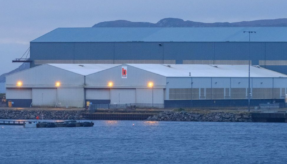
A new review has been launched to spearhead initiatives within the Ministry of Defence when it comes to tackling the challenges of climate change.
Lt Gen Richard Nugee has been appointed to lead the review, which will explore how the department can better incorporate climate change and sustainability considerations into Defence’s processes and policy decisions.
Defence faces fresh and evolving challenges to how and where it operates as a result of climate change. Our Armed Forces, for example, need to be prepared to operate more often in the Arctic region as ice sheets recede and Russian submarine activity increases; our forces are increasingly called upon to assist with natural disasters across the globe; and they need to be able to operate in environments that will and are experiencing more extreme weather patterns.
In addition, defence is one of the largest central government contributors to greenhouse gas emissions resulting from the operation of its aircraft, ships and vehicles plus its large estate of bases and housing.
The former Chief of Defence People will drive climate change policy and planning within the MOD and develop the department’s strategy to reduce its contribution to carbon and greenhouse gas emissions.
The review will focus on the Ministry of Defence’s contribution to NZ50 – the Government’s commitment to reach net-zero greenhouse gas emissions by 2050.
Lieutenant General Richard Nugee said: “The effect of climate change will challenge how our Armed Forces operate today and will need to operate in the future; we need to act now to understand and prepare for the changes that have to be made. At the same time, we must reduce our own emissions to help the nation reach its Net Zero 50 commitment.
“I will be looking at all elements of defence, from equipment to infrastructure, our processes, functions and behaviours to ensure that we develop a response that is built on much of the good work that we are already doing.
“Much of the success of our response will rest on our ability to motivate and harness the passion and enthusiasm of our people and the capabilities of our allies and industrial partners.”
The review will focus on a range of initiatives including the MOD’s NZ50 strategy and setting a baseline for defence’s emissions and carbon footprint.
If you would like to join our community and read more articles like this then please click here







